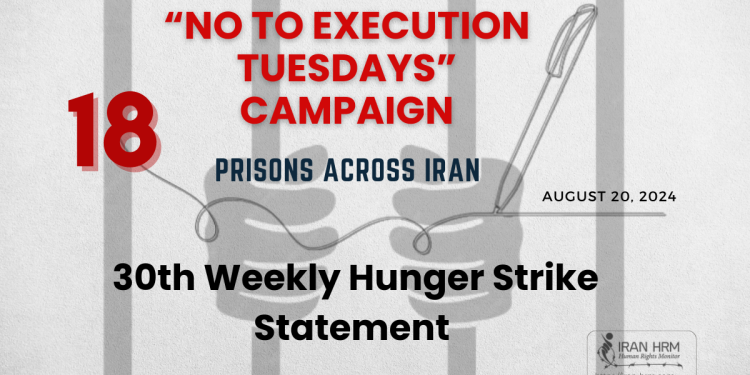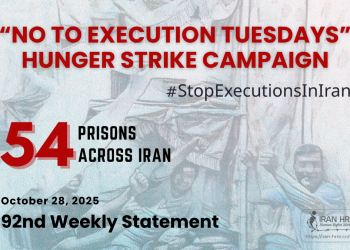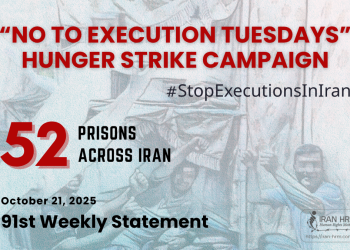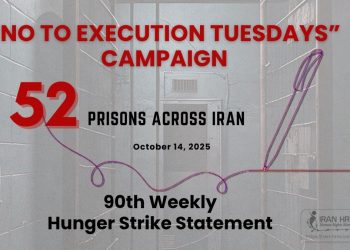The “No to Execution Tuesdays” campaign continues to expand, despite the ongoing repression from the judicial and security authorities of the “Republic of Executions.” Since the beginning of 2024, these authorities have executed over 310 people.
On Tuesday, August 20, 2024, the protest strike initiated by prisoners in the country’s prisons continued into its 30th week. The strike, which began last February under the “No to Execution Tuesdays” campaign, saw further participation from prisoners across the country.
The “No to Execution Tuesdays” campaign, now supported by hundreds of prisoners across 18 prisons, has consistently aimed to oppose the death penalty. The campaign protests the death penalty as an inhumane and irreversible punishment, regardless of the charges, motives, or beliefs of those sentenced to death, and advocates for the abolition of this cruel practice.
The continuation and expansion of the “No Executions Tuesdays” campaign come as the judicial and security authorities of the “Republic of Executions” have carried out more than 310 executions since the beginning of 2024. Among these victims of the death penalty, 16 women prisoners have also been executed in recent months. The regime has significantly accelerated its execution campaign, with 118 people executed in August alone.
The Solution to All Crises at the Foot of the Gallows
The extent to which the regime has relied on the death penalty recently suggests that the authorities have systematically embraced the gallows as their solution to all crises. In a sense, they seek “harsh revenge” by executing the children of this land, believing that violence and death are the means to maintain control.
Meanwhile, the women’s community, which could be the driving force for fundamental change in Iran, has faced even greater repression both in the streets and in prisons. The statistics of 16 women prisoners executed over the past five months, along with the arrests and violence against women under the pretext of the state-imposed hijab laws, highlight the regime’s violent response. In some cases, these actions have led to deaths or violations of women’s health rights. These actions clearly reflect the regime’s determination to suppress women, who are seen as a leading force for fundamental change in Iranian society.
It is clear that the Islamic Republic does not merely execute a group of 100 or 120 people in a single act; rather, it executes 120 “individuals” in their own isolation. All the others, including thousands of prisoners, are left to languish in helpless anticipation of their last day and impending execution.
As the prisoners of Evin and Lakan Prisons in Rasht have correctly pointed out, the only way to confront and stop this machine of death and executions is through mass and nationwide actions and protests. Regardless of motives, beliefs, or backgrounds, the death penalty is a social issue, enforced by the government, and can only be effectively confronted collectively and with unity.
The Necessity of Unity with the Prisoners of the “No to Executions Tuesdays” Campaign
This call for unity and solidarity to confront the death penalty has been repeatedly emphasized by the prisoners involved in the “No to Execution Tuesdays” campaign. They have called on everyone to stand up in any way possible and support the prisoners in their resistance against the continuation of executions. This resistance, which has emerged from within the prisons, now needs the solidarity of the wider society to be effective.
According to reliable sources, the striking prisoners of the “No to Execution Tuesdays” campaign are currently on strike for the 30th consecutive week in various prisons across the country. These include Evin Prison (Wards 4, 6, and 8), Ghezel Hesar Prison (Units 3 and 4), Karaj Central Prison, Khorramabad Prison, Nizam Shiraz Prison, Mashhad Prison, Qaemshahr Prison, Lakan Prison in Rasht (Women’s and Men’s Ward), Tabriz Prison, Ardabil Prison, Khoy Prison, Naqadeh Prison, Urmia Prison, Salmas Prison, Saqqez Prison, Baneh Prison, Marivan Prison, and Kamyaran Prison. These prisoners are protesting the issuance and implementation of death sentences and are calling on all fellow citizens, especially prisoners in other prisons, to join and support the “No Executions Tuesdays” campaign.
Additionally, they have called on the United Nations Special Rapporteur on Human Rights, Ms. Mai Sato, to pay special attention to the inhumane acts taking place in Iran, particularly the death penalty, and to make urgent efforts to halt these executions and put an end to this brutal practice.







